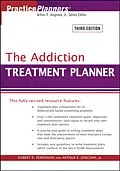The Addiction Treatment Planner, Third Edition provides all
the elements necessary to quickly and easily develop formal
treatment plans that satisfy the demands of HMOs, managed care
companies, third-party payors, and state and federal review
agencies.
* This Third Edition includes new language for
evidence-based care that fits mandates set forth by the American
Society of Addiction Medicine (ASAM), which are being adopted by
most state accrediting bodies
* New chapters cover chronic pain, dangerousness/lethality,
opioid dependence, and self-care
* Saves you hours of time-consuming paperwork, yet offers the
freedom to develop customized treatment plans
* Organized around 42 main presenting problems, including
chemical and nonchemical addictions such as substance abuse, eating
disorders, schizoid traits, and others
* Over 1,000 well-crafted, clear statements describe the
behavioral manifestations of each relational problem, long-term
goals, short-term objectives, and clinically tested treatment
options
* Easy-to-use reference format helps locate treatment plan
components by behavioral problem or DSM-IV-TR diagnosis
* Includes a sample treatment plan that conforms to the
requirements of most third-party payors and accrediting agencies
(including HCFA, JCAHO, and NCQA)
Autorentext
ARTHUR E. JONGSMA, Jr., PhD, is Series Editor for the bestselling PracticePlanners®. Since 1971, he has provided professional mental health services to both inpatient and outpatient clients. He managed a group private practice for twenty-five years and is now a staff member at Life Guidance Services in Grand Rapids, Michigan.
ROBERT R. PERKINSON, PhD, resides in Canton, South Dakota. He is Clinical Director of the Keystone Treatment Center in South Dakota and author of Treating Alcoholism: Helping Your Clients Find the Road to Recovery (Wiley).
Klappentext
The Addiction Treatment Planner, Third Edition provides all the elements necessary to quickly and easily develop formal treatment plans that satisfy the demands of HMOs, managed care companies, third-party payors, and state and federal review agencies.
- This Third Edition includes new language for evidence-based care that fits mandates set forth by the American Society of Addiction Medicine (ASAM), which are being adopted by most state accrediting bodies
- New chapters cover chronic pain, dangerousness/lethality, opioid dependence, and self-care
- Saves you hours of time-consuming paperwork, yet offers the freedom to develop customized treatment plans
- Organized around 42 main presenting problems, including chemical and nonchemical addictions such as substance abuse, eating disorders, schizoid traits, and others
- Over 1,000 well-crafted, clear statements describe the behavioral manifestations of each relational problem, long-term goals, short-term objectives, and clinically tested treatment options
- Easy-to-use reference format helps locate treatment plan components by behavioral problem or DSM-IV-TR® diagnosis
- Includes a sample treatment plan that conforms to the requirements of most third-party payors and accrediting agencies (including HCFA, JCAHO, and NCQA)
Zusammenfassung
The Addiction Treatment Planner, Third Edition provides all the elements necessary to quickly and easily develop formal treatment plans that satisfy the demands of HMOs, managed care companies, third-party payors, and state and federal review agencies.
- This Third Edition includes new language for evidence-based care that fits mandates set forth by the American Society of Addiction Medicine (ASAM), which are being adopted by most state accrediting bodies
- New chapters cover chronic pain, dangerousness/lethality, opioid dependence, and self-care
- Saves you hours of time-consuming paperwork, yet offers the freedom to develop customized treatment plans
- Organized around 42 main presenting problems, including chemical and nonchemical addictions such as substance abuse, eating disorders, schizoid traits, and others
- Over 1,000 well-crafted, clear statements describe the behavioral manifestations of each relational problem, long-term goals, short-term objectives, and clinically tested treatment options
- Easy-to-use reference format helps locate treatment plan components by behavioral problem or DSM-IV-TR diagnosis
- Includes a sample treatment plan that conforms to the requirements of most third-party payors and accrediting agencies (including HCFA, JCAHO, and NCQA)
Inhalt
Contents Listed by ASAM Assessment Dimensions.
PracticePlanners® Series Preface.
Introduction.
Adult-Child-of-an-Alcoholic (ACOA) Traits (Dimension 3).
Anger (Dimension 3).
Antisocial Behavior (Dimension 3).
Anxiety (Dimension 3).
Attention-Deficit/Hyperactivity Disorder (ADHD; Dimension 3).
Attention-Deficit/Inattentive Disorder (ADD; Dimension 3).
Borderline Traits (Dimension 3).
Childhood Trauma (Dimension 3).
Chronic Pain (Dimension 2).
Dangerousness/Lethality (Dimension 3).
Dependent Traits (Dimension 3).
Depression (Dimension 3).
Eating Disorders (Dimension 3).
Family Conflicts (Dimension 3).
Gambling (Dimension 3).
Grief/Loss Unresolved (Dimension 3).
Impulsivity (Dimension 3).
Legal Problems (Dimension 3).
Living Environment Deficiency (Dimension 3).
Mania/Hypomania (Dimension 3).
Medical Issues (Dimension 2).
Narcissistic Traits (Dimension 3).
Nicotine Abuse/Dependence (Dimension 1).
Occupational Problems (Dimension 6).
Opioid Dependence (Dimension 1).
Oppositional Defiant Behavior (Dimension 3).
Parent-Child Relational Problem (Dimension 6).
Partner Relational Conflicts (Dimension 6).
Peer Group Negativity (Dimension 6).
Posttraumatic Stress Disorder (PTSD; Dimension 3).
Psychosis (Dimension 3).
Relapse Proneness (Dimension 5).
Self-Care Deficits--Primary (Dimension 3).
Self-Care DeficitsSecondary (Dimension 3).
Sexual Promiscuity (Dimension 3).
Social Anxiety/Skills Deficit (Dimension 3).
Spiritual Confusion (Dimension 3).
Substance Abuse/Dependence (Dimension 1).
Substance-Induced Disorders (Dimension 1).
Substance Intoxication/Withdrawal (Dimension 1).
Suicidal Ideation (Dimension 3).
Treatment Resistance (Dimension 4).
Appendix A. Bibliotherapy Suggestions.
Appendix B. Index of DSM-IV-TR Codes Associated with presenting Problems.
Appendix C. Client Satisfaction Surveys: Resource Material.
Appendix D. ASAM Six Assessment Dimensions: A Checklist Example.
